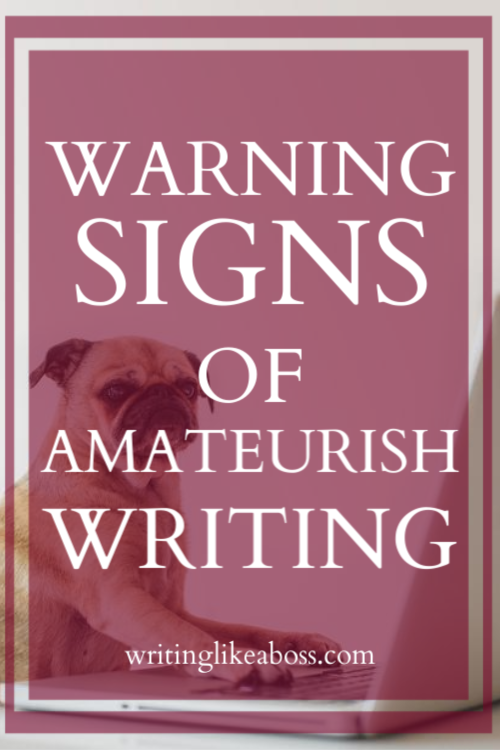As writers, the last thing we want to do is appear amateurish.
Especially if you’re an independent writer, the pressure is worse than ever. If you slip up, you lose your credibility.
But do you know the warning signs of amateurish writing?

10 WARNING SIGNS OF AMATEURISH WRITING
*note: this refers generally to book-writing, particularly fiction.
1. EXCESSIVE PUNCTUATION
Of course, this refers to sentences that end in two or more !, ?, or worse, ?!. But it also refers to frequent exclamation point usage.
Some good rules of thumb:
- if your dialogue needs an exclamation point, usually the dialogue or action isn’t strong enough
- you never need an exclamation point in narration, unless it’s a children’s book
HOW DO I FIX IT?
Limit your exclamation point usage to 2 every 50k words. Never use “!!,” “??,” nor “?!“.
2. SHOWING OFF YOUR KNOWLEDGE
A lot of writing requires research. Once you’ve done the research, it only makes sense to share what you’ve learned with the reader, right?
No. You have to be conscious of blatantly sharing information.
HOW DO I FIX IT?
For example: say you had to research women’s roles during WWII America. You could write, “Many women started working in factories after the men went to war.”
Or, you could relate the information to the story: “Minnie started working at the factory down by the shipyard. Just a couple weeks later, Jane and Pearl joined her.”
Be subtle in how you relay information, especially historical fact. Your reader is always smarter than you expect.
3. UNINTENTIONALLY HEAD-HOPPING
It’s amazing how many people will complain about head-hopping in a book.
The problem is it draws you out of the story. You’re focused on one character, and then you’re jolted into the mind of another.
HOW DO I FIX IT?
Head-hopping happens a lot in first drafts, which is fine. What happens in a first draft stays in the first draft. But when you get to editing, be conscious that you’re staying within the mind of your main character(s).
4. UNREALISTIC CHARACTER ACTIONS
A character gasps dramatically at stunning news. A wounded character “suddenly finds the strength” to run. A character who was just crying is now laughing. See the pattern?
Beyond action, this applies to dialogue. No realistic sibling would say, “Hey, lil’ bro.” And no one in their right mind would say, “Your sister Liz is part of the clan, isn’t she?”
HOW DO I FIX IT?
Keep the context of the scene in mind. e.g. If the scene is dramatic, the characters most likely won’t be laughing.
And for dialogue: keep in mind the characters, the context, and the relationships. If you’re unfamiliar with a certain relationship dynamic, do some research first!
5. OPENING EVERY CHAPTER THE SAME WAY
A lot of new writers will open a scene with a character waking up. That’s only natural, right? I mean, if you think of the start of your own day, it starts with waking up.
“The difference between fiction and reality? Fiction has to make sense.” – Tom Clancy
Even if you don’t start your chapters by a character waking up, it’s important to be mindful that your scene openers don’t follow the same pattern. It can start to get melancholic.
HOW DO I FIX IT?
Mix it up a little! Play around with your openers. It’s fun to get creative with it.
If you’re editing, it helps to cut everything up till where the action starts.
6. UNNECESSARY SCENES
My brother suggested this one: “if you keep a scene you had to cut just because you like it, that’s a bad sign.”
HOW DO I FIX IT?
If the book still reads fine without the scene, that’s a good sign it should be cut. If you aren’t positive, ask a friend or critique partner.
7. UNNECESSARY WORD CHOICE
This applies to two things –
One: filler words like was, that, and so.
Two: using out-of-place words to make your writing “more intelligent,” especially if you use a thesaurus.
HOW DO I FIX IT?
Firstly, don’t use big words that make you seem smarter. The best writers can get their points across using the simplest terms.
Second, be mindful of filler words, especially while editing. Here are some examples of filler words from Writers Write:

8. IMBALANCED DIALOGUE
The trick with action writing is to balance dialogue and, well, action.
On one end of the scale, you can have a scene that’s all dialogue and little action. It can get boring. Your readers are thinking, just do something already!
On the opposite end, however, it’s all too common to have scenes that are all action. Just say something already!
It’s a tricky thing to balance. But the solution is simple.
HOW DO I FIX IT?
Whether you lean toward dialogue or action, remember you can mix them. Here’s a quick example:
“Isabel?” she said. “I never cared for her.”
And here’s that same line, with an action in place of the tag:
“Isabel?” She leaned back in her seat, picking at her fingernail. “I never cared for her.”
See more examples below:
Bonus: filler words in an attempt to make dialogue “more realistic,” including um, uh, so, well, and even yes and no. Oftentimes, these filler words can be scrapped entirely.
9. POOR PACING
Pacing is one of the most difficult sides of technical writing to master. But it’s worth learning!
Fast pacing is when the scene seems to move quickly, like a chase scene. Slow pacing is, you guessed it, slow; like a heartfelt scene.
But mess it up, and your readers will either get overwhelmed by the speed, or bored by the gradual pulling along.
HOW DO I FIX IT?
Pacing may seem out of control, but you have more power over it than you might think.
Quick words and short sentences make fast pacing. While longer words, more punctuation, and lengthy paragraphs tend to slow the writing. Neither are “bad.”
You can change it based on the context: if you’re writing a fight scene, stick to fast pacing. but if it’s a romantic scene, slow pacing should do the trick.
10. IDENTICAL CHARACTERS
Your readers want a diverse, entertaining cast of characters. And to pull it off, they can’t be duplicates of one another.
HOW DO I FIX IT?
Take the time to develop your main characters through character questionnaires and writing exercises. What can also help is to practice writing scenes from the underdeveloped character’s point of view.
Here’s a post that may help:
LET’S RECAP!
10 warning signs of amateurish writing:
- excessive punctuation
- showing off your knowledge
- head-hopping (unintentionally)
- unrealistic character actions
- opening every chapter the same way
- unnecessary scenes
- unnecessary word choice
- imbalanced dialogue
- poor pacing
- identical characters
Have anything to add? Please share below!
And of course, happy writing.


Comments
47 responses to “10 Warning Signs of Amateurish Writing & How to Fix Them”
how about fillers in dialogue to make it seem more realistic ??
Absolutely! That’s definitely a big one. I’ll add it to the post, thanks for the addition!
Grace Burrowes is bad about #7 and #10. She uses all these $10 words that nobody uses. I was constantly having to look up words as I read to figure out what was being said. And all of her male characters are the same. The stories themselves are quite similar, but the male characters especially are all the same tender hearted, understanding men who somehow all fully understand a woman’s mind. Really?
And then Katheryn Anderson’s novel Viking Love Beyond Time is a good example of #2. She literally lists 20 plants the character sees as she takes a walk and lists 20+ foods at meals (repeatedly, not just once which would be bad enough) throughout the book. At times it sounds more like a nonfiction book about the Vikings or Middle Ages than a novel. And she has no concept of the word “concise.”
Oh yes, those are big problems I’ve found in fiction as well. If I pick up a novel, I don’t want nonfiction-esque writing!
Beautifully practical points! Just started a writing career and I found this so helpful!
*slight correction:
In point number 9, you wrote “How IT fix it” instead of “How I..”
Wholeness!
Thank you for the correction! It’s fixed now. So glad it was helpful!
I haven’t read any of the books by the authors you mentioned here, but I can see the issue from both sides. If a book is set in places completely foreign to us (both in location and period) then it makes sense for the author to want to try and give the reader an immersive experience via world building and scene setting; fantasy is especially difficult to convey without a degree of world building woven into the text. I appreciate that too much might be distracting, but of the few fantasy books I have enjoyed, it was the details which really did get me to feel fully involved. I think David Eddings was one who successfully got the balance right. It could in some degrees come down to a case of personal taste. Some people prefer a shorter, briefer text which gets immediately into the action, others will feel more at home with more description.
My issue is with the notion of my appearing to have used a thesaurus or some other such source, because some of the vocabulary I use is deemed to be pretentious or fake. The fact that I find myself forever having to review anything I write, in order to screen out any words that might lead to accusations of ‘dictionary delving’, is actually pretty annoying. But then I suppose one can’t expect anything else in a world where using a semi-colon in a text message is looked upon with a mixture of confusion and ire.
I wonder if David Foster Wallace would have gotten so much as a personally addressed reject-slip, in this age of oversimplification?
Good advice. Thanks
[…] 10 Warning Signs of Amateurish Writing & How to Fix Them […]
I just started writing a children’s/adult’s fictional book. It have many characters in the story with an assortment of personalities. I am learning a lot as I go. I enjoyed your 10 warning signs for amateurish writing. I’m sure I make a lot of these mistakes and could use the advice. My problem is to stop writing in the past tense.
Ahh yes, that’s definitely a problem for me, too. I’m glad the post was helpful! Best wishes with your new book!
oops it has many characters
[…] 10 Warning Signs of Amateurish Writing & How to Fix Them […]
Is there any situation where head hopping works and is appropriate? My case involves five characters, the main protagonests and 4 other major characters being simultaniously tested by a very dangerous magical tree. What one does affects the others. I rotate a few times through the five giving each a paragraph, until three escape and 2 are changed by the tree.
Yes, there are exceptions to all of these! In this circumstance, I could see it making sense to head-hop during the tree scene.
Is there a difference between UN-balanced and IM-balanced? I’ve never encountered the latter.
According to englishstackexchange.com, “imbalance is the noun meaning the state of being not balanced, while unbalance is the verb meaning to cause the loss of balance.” Hope this helps!
Ha.
To this day, my brother says “Hey, lil’ sis” whenever he sees me.
It’s true, most people don’t refer to each other by labels, but it did give me a chuckle.
Haha, I love that!
Great tips. I am finishing my 6th novel over this December break. Most of your points are taken care of in my normal way of writing. But this is a great checklist when I start editing within the coming month.
Thanks for sharing.
That’s so exciting! I’m so glad you found this list informative for your upcoming editing process. Best of luck!
I feel like I was being pointed out.
[…] Mistakes To Avoid In Writing. […]
[…] Mistakes To Avoid In Writing. […]
All excellent points. Since amateurs are just us at a later time point, let’s give some encouragement. With these points in mind, write, write, write, write. After a while, you will know your writing has reached a new level when you break every one of these guidelines. Not with impunity, but with purpose. 🙂
Agreed, Rafael! I love the encouragement. Write, write, write!
I enjoyed your article. Good to know I am not an amateur, as I am aware of all 10. I do have a problem with excess words, though, especially when I write quickly and without purpose. Your advice is practical, delivered in a down to earth manner. Some writing resources have a snobby, superior tone that is off-putting.
I agree, Christy! Thank you for the feedback. 🙂
I came here from your Friday live stream. This is such a great post! Very helpful, especially since I’m an I die pub and don’t want to look childish when people read my novels. Thanks!
Hey there, Bethany! Thank you for joining us on Friday. I love connecting with people through my live-streams. 🙂 Thanks so much for the feedback! I’m glad you enjoyed the post!
[…] 10 Warning Signs of Amateurish Writing & How to Fix Them […]
How about dialogue tags other than “said”? For example: “Hello there,” she whispered. “What are you doing here?” he exclaimed.” “Wouldn’t you like to know,” she chuckled. Amature hour. When you consistently use “said” (when you’re not using actions instead), the “said” basically disappears and the reader can focus on the dialogue instead of the dialogue tags.
Agreed 100%! The “said is dead” trend gets under my skin so badly. Thanks for sharing!
Hello Samantha, I read your tips. I am also an amateur writer. I also noticed lot of your mentioned mistakes in my writing too.
There seems to be a lot of conflicting advice on using the word ‘said’. Some writers seem to avoid it altogether and use words like ‘gushed’, ‘shouted’ or any other word to describe how their character is talking. When I’m writing I use ‘said’ but if you use dialogue with action you can usually avoid it especially when only two people are talking. You don’t need ‘said’ every time someone stops talking.
Agreed, Nanette. I don’t think there is anything wrong with using “said,” but I also don’t think there’s a problem with verbs like “gushed” and “shouted.” It’s all about a balance.
For me personally, I don’t use a lot of dialogue tags in general. But when I do, I use “said” for the most part, other verbs a little more exclusively. Those other verbs pull me out of the story; “said” blends in, it’s invisible. But again, it’s all about balance!
These guidelines are wonderfully expressed. And, when you say “Have anything to add? Please share below!” you really mean it; your personable responses to the comments have amazed me. As to personable, I appreciate your ending: “And of course, happy writing.”
Thanks for the feedback, Bonnie! I appreciate that. I try my best to engage with my readers as well as possible. 🙂
Its great guide, i like the part how do i fix it, it helps reflections
Good tips, just starting out.
OMG!! I’m a brand new writer and this article left me feeling exposed! Thank you so much for taking the time out to share this with us!
I’m so glad it was helpful, Kandice! I love that you’ve just started writing, and you’re already looking for tips on improving your craft! If you have any questions or anything at all, please feel free to reach out to me at likeaboss.writing@gmail.com. Best of luck!
This is interesting and a big guidance toward growing me as a writer. I want to know if you could assess a story of mine with specific good and bads. It will be of good help for me to improve.
Thanks
Ha, I knew I couldn’t escape the use of excess words. Also, my characters seem to have a similar voice, especially the females. I won’t call myself an amateur, but it gets real when I start editing.
It’s always ‘back to the drawing board’ for me but seeing that I only faulted at two out of the entire list gives me great hope.
I have the same issue with my work, in that my characters’ voices blend together. That’s a tricky part of writing, because you have to get out of your own mind and into those of the characters, which isn’t an easy task.
Two out of ten is great news! It sounds like you’re doing great!
This was very helpful, thank you for these tips!
I’m so glad it was helpful!